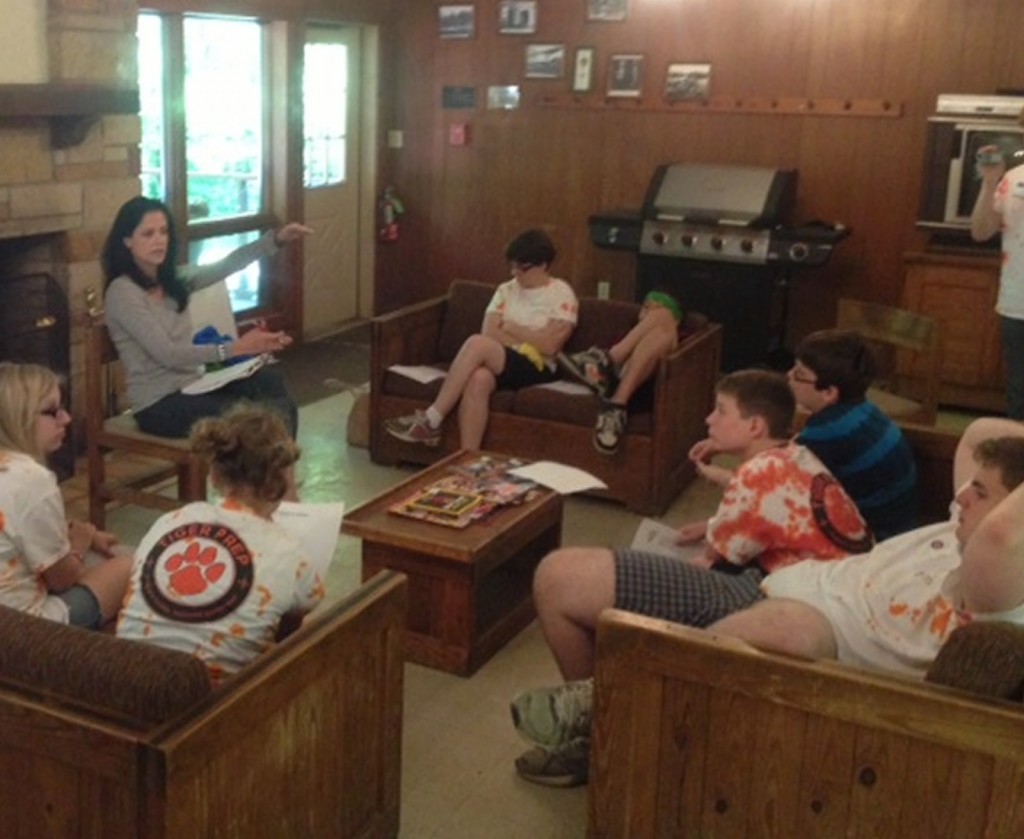
Are your special needs children and students safe on the Internet? How do you know?
Many of you know that I’ve been teaching children, parents, and school districts about Internet Safety and online risks for many years. Quite often I will be asked to donate some time to reach out to a particular group of at risk children.
I’ve spoken to children and parents at every end of the socioeconomic, geographic, and academic spectrum. One thread unites them all – you all want the best for our children….you all want to keep our children safe. But, most of the time you don’t know HOW to do that.
A few months ago after a presentation, an acquaintance of mine asked if I would come and speak at a summer camp for special needs children. This particular summer camp aims to provide their campers with practical life skills. Of course I said yes….
Special needs children need internet safety instruction, so do their parents (desperately)
This would be the first time I would be speaking to children who are not considered “typical” and I had NO idea what to expect. Upon arrival I realized quickly that I would be speaking to children at each end of the spectrum; some of the children had trouble communicating in a “typical” way, and others were chatterboxes. So far it felt exactly like speaking to any group of middle schoolers.
The children were split into smaller groups (that’s me in the photo gesticulating wildly as usual) and we were off. I began by explaining the difference between predators and prey. We used the example of a porcupine and how a porcupine makes it difficult for any would be predator by the clever use of his quills. We all have a gut-instinct when things feel wrong, I asked them to listen for that “sick stomach feeling” as the first sign to put up their quills.
As a parent do you understand the risks associated with sexting?
I asked the children if they knew what the term “sexting” meant. Almost 100% of these children had already heard about or seen sexted messages. In addition 100% of these children personally owned one or more internet-ready devices which they used with little or no parental supervision. Again, identical to most typical children.
I asked the children if they would ever be willing send a photo of “their junk” to someone else. Most of the children vehemently said: no, no, of course not. One child who quickly became one of my favorites – Will – hesitated. I asked his permission to use a pretend scenario. His enormous mischievous smile told me that he was up for just about anything.
Children are being charged as sexual predators for sexting other children
We made up a girlfriend for Will named ‘Suzie Q’ – when I described Suzie Q as being tall and blonde and very lovely, the other kids just howled with laughter. We created a scenario where Suzie Q is at a sleep-over (I hate sleepovers) and she asks, no BEGS, Will for a texted photo of his junk. And tells him that if she was really his girlfriend, that he would comply. “So, Will – what are you going to do? Do you send the photo, or do you lose the girlfriend?” To his credit, and still wearing an enormous smile, he said: “I don’t know, I think I might send it.” Which was as honest an answer as you can ask from a 14 year old boy. Typical or not.
So we ran the scenario all the way through to the point that Suzie Q receives the photo (at the wretched sleepover) and sends it along to all of her friends. So what, right? Well, the children (and a few counselors) were shocked to find out that a child can be charged with creation of child pornography for taking a photos of his OWN junk (as it were), the child who receives it can be charged with possession of child pornography AND distribution of child pornography if she sends it along to her friends.
Will kept smiling, but he did eventually say that he would not be sending on any photos of his junk. Again, the right answer from a great kid.
Cyberbullying, sexual predators, and being skeptical
All of the kiddos in my so-called atypical audience had personal experience with cyberbullying. They understood very easily what it feels like, smells like, and tastes like. They shared some of their real-world bullying stories and we then applied those to the cyber world and what they would look like. We discussed the use of Instagram (which I HATE for children) and Twitter (which I hate only slightly less for children).
When I got to the section on sexual predators, again, they were as easily fooled by my real-life scenarios as my typical middle school students. When they’re playing XBox Live or any other community gaming system, it would never occur to them that their virtual teammate is NOT an actual 14 year old, and might rather be a 45 year old predator from a different state. Why would anyone lie about that? We talked about sexual predators who want to do sexual harm to them and how those porcupine quills come in handy to defend themselves.
Teach your children how to be safe
At the end of this experience it struck me just how typical these children really were. All children aged 9-16 are gullible in their own way, they don’t assume that there are people in the world intent on doing harm to children, they don’t think that they might be putting themselves at risk by posting their phone number or sharing their passwords.
Cognitive or behavioral ability has no bearing on your responsibility as a parent or as an educator, particularly when as a society we’ve decided that it’s perfectly acceptable to leave children as young as 5 years old with web enabled devices and little or no supervision.
Teach your children to be skeptical. Teach them to listen to their gut instinct. Have provocative conversations about sex, sexting, and predatory behavior so that they can feel uncomfortable in a safe environment. Run through possible scenarios and role play what their answers and reactions might be.
And if they do not comply with your house rules – smash the phone with a hammer. That’s right, I said smash. Better the sound of smashing glass, than a call from the police that your child is missing. Forgive me if it sounds a bit melodramatic – it isn’t. Wake up.
Interestingly enough, this is exactly what I do with the typical kids. Proving again that there is more in this world that unites us, than what divides us.
Thank you, thank you, thank you to Jannine and everyone at “camp”. I will never, ever forget my day with these amazing young men and women. I will carry their comments with me into other groups and presentations.
And a special thank you to my new BFF Scott, a camper, who said “My life philosophy is that mean people should be told that they are being mean.” Thank you Scott for reminding me that sometimes you just have to tell it like it is. Hugs to my new favorite campers!!!


 I’ve been teaching Internet Safety for almost 10 years now.
I’ve been teaching Internet Safety for almost 10 years now.